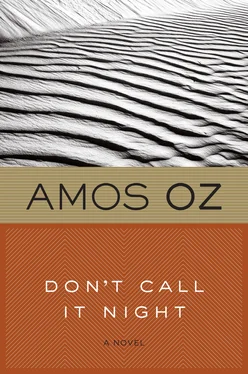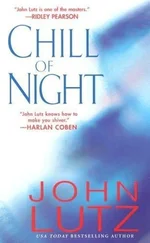I said I didn't drop hints.
Noa said: But it's what you think. Don't deny it. You have made up your mind that I have taken on a task, no, not a task, more of a hobby, that is unnecessary, foolish and also too much for me.
I said: That's not correct.
And Noa, almost in tears: But I really do want it now. I want to wear it for the weekend. Do you mind if we go back?
We did a U-turn in front of the Kedar Hotel and drove back to Desert Chic and caught Paula Orlev just as she was shutting up shop. She opened up again for us and Noa put the Balkan dress on again. Paula said she knew we'd be back, she'd spotted at once that the dress liked Noa even more than Noa liked the dress, it looked so fresh on her, so cheeky, so cool, as her daughter always said, You must know her, Noa, Tal Orlev, you taught her in eighth grade.
When I took my credit card out Noa suddenly said, shyly, that she still wasn't a hundred percent sure. She asked me this time to tell her honestly what I thought. I said: Try to concentrate. The question is whether you feel good in this folksy dress or not.
Paula Orlev asked if I wasn't in too much of a hurry. And Noa told me to stop putting pressure on her instead of helping her make up her mind. It's so complicated with you, Theo, it's getting more and more unpleasant. The word "folksy" didn't exactly come out of the kindness of your heart. And turning to Paula she asked if she had anything similar but with less embroidery, or at least where the embroidery was less prominent.
At a quarter past two we left the shop again. Without the dress and also without that subtle affection that had joined us when we went in, left over from the night, from yesterday evening, and now we'd lost it. It didn't help when I pointed out that she, not I, had been the first to use the word "folksy". On the way home we stopped at the Palermo for a quick pizza so we shouldn't have to start making lunch at home, and by three o'clock we had somehow managed to do the weekend shopping in the supermarket and pick up the dry cleaning. Together we put the contents of the plastic bags away in the refrigerator and the kitchen cabinets and our clothes in the wardrobes. Noa said she thought that Paula was one of those nice people who you can see at once get real pleasure out of making you feel good. Such people are a rare commodity. It's as if she was choosing a dress for herself, not trying to sell one to me. I liked it when we went back, and she said the dress liked me. You probably weren't listening, Theo. You didn't enjoy being there. You weren't very nice, never mind about me, but Paula really didn't deserve that Arctic blast.
An Arctic blast on a day as hot as this, I said, actually wouldn't be so terrible. And I went on, Mrs. Orlev didn't strike me the same way as she did you. She seemed calculating. But of course I may be mistaken, I may even be doing her an injustice. This made Noa express some sharp remarks about "my character" — I always feel I'm being cheated, always adopt a negative stance, in advance, and whatever the situation, I'm suspicious, defensive, as though everybody is an enemy. The whole world's against us. Anyway, that's the world according to Theo. My father was a hot-tempered, even an aggressive man, who could fly off the handle and go really wild, raging at me and throwing his transistor at me or smashing it against the wall, but he wasn't a sour man. He wasn't bitter. There are times when you're even more of a spoiled child than he was. Even more of a Neanderthal male.
Isn't your lightning judgment a bit black-and-white, Noa?
With you everything's always black-and-black.
She left the room, flushed, sparking, pushing the door to angrily, but stopping it from slamming at the last moment and closing it gently without making a sound.
She took a long shower, apparently a cold one, and then shut herself up in her bedroom to rest because in the night, she said, she had not managed to get to sleep until she dropped onto the sofa in the living room at around three o'clock in the morning: Your tension, Theo, fills the apartment like a smell.
I knew precisely what to reply. But I restrained myself. Instead I concentrated for a moment and found not tension inside myself but an unrelieved tiredness. After she shut her door I went to my own room, without the weekend Ma'ariv or the local paper that I'd left at the California Café. The BBC World Service, from London, via the relay stations in Gibraltar, Malta and Cyprus, brought me a detailed, ruthless description of the destruction of the rain forests in South America, in a series of broadcasts under the title "The Death of Nature". The rain forests brought back a few memories, whereas the expression "The Death of Nature" left me cold even though it was presumably intended to shock listeners. On the contrary: "The Death of Nature" had such a soothing effect on me that I fell asleep for twenty minutes and woke up only as the programme was ending and another; on changes in shipping routes, was beginning. The only way to help her is not to try to help. I should contain myself and say nothing. How many times have I reduced her to tears simply by trying to be helpful? Once, in her absence, I went through the whole apartment gathering her bits of paper that were scattered all over the place: on the kitchen table, on the coffee table in the living room, by the telephone, on the bookshelves in her bedroom, on shelves in the hall and the living room, and under little magnets clinging to the door of the refrigerator; on her bedside night table and on the floor at the foot of her bed. I carried all the loot oft to my room and put it down on my desk, and I spent nearly three hours sorting it out for her: I put letters in one pile, drafts of memos in another, public opinion surveys, excerpts she had copied in her perfect handwriting from the books in Hebrew and English that the librarian had put together for her on drugs, their cultivation and distribution, influences, addiction and rehabilitation, another pile for prospectuses, noncommittal or negative replies, some of them polite and some less so, from all sorts of institutes, organizations and bureaus, and hundreds of scraps of paper with telephone numbers or dates of meetings.
After an initial sorting I made a pile on the left-hand side of my desk of everything that had a date. I arranged them by date and subject and addressee. I copied the telephone numbers for her into a little notebook. I cleared out one of my own files for her and organized all the papers in eight compartments separated by coloured cardboard dividers on which I wrote precisely what was in each section.
Great, she said when she got in, wonderful. So logical. Thanks.
And the next moment, almost in tears: Who gave you permission, Theo? They're not yours, they're mine.
I promised. I didn't touch them again, I didn't say a word, even when the contents of the file quickly dispersed and settled again like feathers over every available surface in the apartment.
Another time I left the office one morning and popped across to the printers opposite the traffic lights to order some headed notepaper and a receipt book in the name of her committee, and I even volunteered our own address and telephone number for their temporary use. This time she neither thanked me nor turned tearful but merely said in a quiet, hard voice, as though she were admonishing a disruptive pupil: Theo, this is going to end badly.
I said: Try to understand, Noa. Concentrate for a minute. I've noticed that apart from your African benefactor, the father of the junkie, you've had at least two further gifts. Small ones admittedly. Insignificant in fact. Still, you must realize that the law of the land stipulates that for any donation, however minimal, you must issue a proper receipt. It's a criminal offence not to. Surely you don't want us to get into trouble.
Читать дальше












